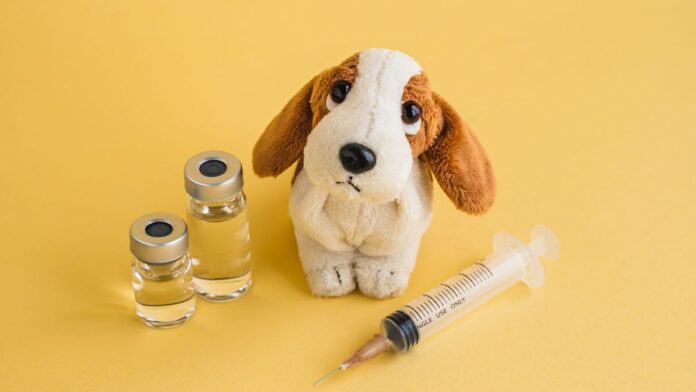Introduction on What Vaccines Do Dogs Need for Grooming?
Dog grooming is an essential component of pet care, contributing to cleanliness and overall well-being. Given that grooming facilities often accommodate multiple animals simultaneously, the potential for disease transmission is heightened. But, What Vaccines Do Dogs Need for Grooming? Consequently, vaccinations are vital for safeguarding both pets and the establishments that cater to the health, safety, and well-being of animals, ensuring a protected environment for all.
From a legal perspective, it is crucial to ensure that dogs are adequately vaccinated prior to grooming to mitigate liability risks, protect public health, and adhere to local regulations. This document examines the legal obligations surrounding dog grooming vaccinations, the implications of non-compliance, and how groomers and dog owners can effectively navigate these requirements.
ALSO READ: Why Is My Dog Twitching and Acting Weird? Legal Insights for Concerned Pet Owners
Why Are Vaccinations Essential for Dog Grooming?
1. Preventing Disease Spread
Grooming environments are high-contact areas where diseases can easily propagate through shared equipment, surfaces, and even airborne particles. Vaccinations serve as a defence against contagious diseases such as rabies, parvovirus, and kennel cough, thereby lowering health risks for pets, their owners, and grooming staff.
2. Safeguarding Public Health
Certain diseases, including rabies, are zoonotic, meaning they can be transmitted from animals to humans. The presence of unvaccinated dogs in grooming settings heightens the risk of exposure, leading to significant public health issues and potential legal ramifications.
3. Reducing Legal Risks
Neglecting to implement vaccination protocols can leave grooming businesses vulnerable to lawsuits if a dog or individual contracts a preventable disease. Establishing clear vaccination guidelines can help mitigate these risks.
Mandatory Vaccines for Dog Grooming
Core Vaccines
- Core vaccines are deemed necessary for all dogs due to their role in preventing serious and widespread illnesses. These typically encompass:
- Rabies: Frequently required by law, this vaccine protects against a lethal disease that affects both animals and humans.
- Distemper, Adenovirus, and Parvovirus (DAP/DHPP): This combination vaccine offers protection against highly infectious and potentially fatal viruses.
Non-Core (Optional) Vaccines
- Although not always mandated by law, these vaccines are advisable based on a dog’s lifestyle and potential exposure:
- Bordetella (Kennel Cough): Often required by grooming establishments, this vaccine helps prevent respiratory infections that can easily spread in crowded environments.
- Leptospirosis: This zoonotic illness is transmitted through contaminated water and soil, making vaccination crucial in certain areas.
- Canine Influenza: This vaccine safeguards against a contagious respiratory disease common among dogs that visit grooming salons or kennels.
Proof of Vaccination
Most grooming establishments necessitate that pet owners present proof of vaccination, such as a certificate signed by a veterinarian. This requirement aids businesses in ensuring compliance and reducing liability risks.
Legal Considerations for Dog Grooming and Vaccinations
Local and State Laws
In the United States, vaccination regulations differ by state and locality. For instance:
- Rabies Vaccination: All states mandate rabies vaccinations for dogs, although the schedule and enforcement practices can vary.
- Business Licensing Requirements: Certain states require grooming facilities to verify vaccination records as a condition for maintaining their licenses.
- Noncompliance with local regulations can lead to fines, business closures, or legal action. Groomers should seek guidance from legal experts or familiarize themselves with local laws to ensure compliance.
Liability Risks for Grooming Businesses
Grooming establishments may encounter legal issues if:
- An unvaccinated dog transmits illness to other animals.
- An employee or client contracts a zoonotic disease.
- Vaccination policies are ambiguous or not consistently applied.
To reduce these risks, businesses should implement clear vaccination policies, provide staff training on health protocols, and maintain thorough documentation of compliance.
Legal Responsibilities for Dog Owners
Dog owners are legally obligated to ensure their pets are vaccinated in accordance with state and local regulations. Noncompliance can lead to:
- Refusal of grooming services.
- Fines or penalties if the dog is involved in an incident.
- Liability if their unvaccinated pet spreads illness to others.
Creating a Vaccination Policy for Grooming Businesses
An effective vaccination policy is essential for reducing legal liabilities and safeguarding pet health. Important components include:
Defined Vaccination Requirements
Outline all necessary vaccines for service, including any recommended non-core vaccines. Specify deadlines for vaccinations (e.g., administered at least two weeks prior to grooming).
Verification and Documentation
Mandate that owners submit current vaccination records from a licensed veterinarian. Retain these records to demonstrate compliance in the event of disputes.
Liability Waivers
Consider having pet owners sign a waiver that acknowledges the risks associated with grooming and confirms their pet’s vaccination status. This can offer legal protection if issues arise.
Exemptions and Medical Exceptions
Clarify whether medical exemptions (e.g., due to health issues) are permitted and what documentation is needed. Exercise caution when accepting unvaccinated dogs, as they may present risks.
Staff Training
Educate employees to identify signs of illness in dogs, enforce vaccination policies, and manage disputes in a professional manner.
Consequences of Non-Compliance
For Grooming Businesses
- Financial Penalties and Legal Consequences: Breaching vaccination regulations or neglecting safety protocols may lead to fines or legal proceedings.
- Damage to Reputation: Adverse reviews or unfavorable media coverage can negatively impact the business’s reputation.
- Loss of Licenses: Failure to comply with regulations could result in the suspension or revocation of operational licenses.
For Dog Owners
- Service Denial: Grooming establishments may decline to service dogs that are not vaccinated.
- Increased Liability: Owners could face legal responsibility if their unvaccinated dog causes injury or harm.
Legal Conflicts Related to Dog Grooming and Vaccination
Conflicts may occur between dog owners and grooming services regarding:
- Lack of clear communication about vaccination policies.
- Claims of negligence leading to the spread of diseases.
- False representation of a pet’s vaccination history by the owner.
How Attorneys Can Assist
Attorneys with expertise in pet law can provide support by:
- Creating or evaluating vaccination policies for grooming establishments.
- Guiding dog owners on the legal requirements for vaccinations.
- Representing clients in disputes concerning vaccination-related issues.
How to Ensure Compliance
- For Grooming Businesses
- Stay updated on local and state vaccination regulations.
- Establish and enforce clear vaccination policies.
- Conduct regular audits of vaccination records to verify compliance.
For Dog Owners
- Ensure your dog’s vaccinations are current and keep accurate records.
- Familiarize yourself with the grooming facility’s vaccination policies prior to scheduling an appointment.
- Collaborate with your veterinarian to confirm that your dog fulfills all health requirements.
Conclusion
Vaccinations play a vital role in dog grooming, safeguarding pets, owners, and businesses from preventable diseases. Legally, it is crucial to comply with vaccination mandates to mitigate liabilities, uphold public health, and ensure the safety of everyone involved.
For grooming businesses, developing comprehensive vaccination policies can help mitigate legal risks and build trust with clients. Dog owners must remain proactive regarding their pet’s health and adhere to both legal and facility-specific vaccination requirements.
By collaborating and following legal vaccination protocols, we can foster a safer environment for our cherished pets and the professionals who care for them.


